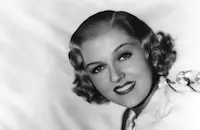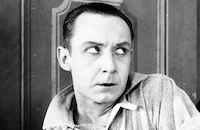Step Lively, Jeeves!

Brief Synopsis
Cast & Crew
Eugene Forde
Arthur Treacher
Patricia Ellis
Robert Kent
Alan Dinehart
George Givot
Film Details
Technical Specs

Synopsis
In London, Russian Prince Boris Caminov tries to interest the Hon. Cedric B. Cromwell in purchasing Czar Nicholas II's crown jewels. Cromwell, however, reveals that he, too, is a conman who has sold phony "crown jewels" many times. Cromwell then proposes a scheme by which, he says, they can make millions together. Posing as a student of history, Cromwell will announce that Sir Francis Drake, the explorer, who plundered many countries, had a son. With promises of untold wealth, they will interest naive American backers to provide them with funds to find the heir to Drake's fortune. After the prince suggests that they instead "create" the heir and use his money to take them to New York, they notice Jeeves, a "gentleman's gentleman," and Cromwell points out that English valets always save their money. They then convince Jeeves that he is Drake's heir, the Earl of Braddock. In America, Babe, the wife of former beer racketeer Barney Ross, reads about the earl's impending arrival and convinces her husband to get him to stay with them at their Long Island estate, so that they can be accepted into society. Ross sends one of his mugs, Max, to the docks to pose as a taxi driver. Upon arriving in America, Jeeves gets into the cab, and reporter Patricia Westley joins him. Police then jump onto the cab's running board and order Max to follow a getaway car. After the chase, which results in a crash, Patricia invites Jeeves into a nightclub, where he bests Max in a drunken bout of leg wrestling. While Patricia calls in her story, Max and Jeeves leave to find Max's brother-in-law for a new bout. Patricia's suitor, wealthy Gerald Townsend III, wagers Patricia $10,000 to a wedding ring that he can bring in a better story than she can about the "earl" and his pals, Cromwell and the prince, whom Patricia suspects are not on the level. Max brings the drunken Jeeves to the Ross estate, and the next morning, Babe orders her husband to invite Cromwell and the prince, because Jeeves asks for them. Gerry, impersonating "Brooks," an out-of-work social secretary, convinces Cromwell and the prince to hire him for the "earl" and talks Babe into hiring Patricia as her social secretary. When Ross demands to have a cut of the "earl's" fortune for $50,000, Cromwell and the prince, who have learned about Ross's violent past, try to sneak away, but they are stopped by one of Ross's mugs. During a wild West charity bazaar that Babe holds in honor of the "earl," Gerry gets a cablegram from a London agent, which identifies Jeeves as a former valet. After one of Ross's mugs steals the cablegram and shows it to Ross, Ross orders Cromwell and the prince to act as if nothing has happened so that Babe's big night will not be spoiled. At the party's end, after the upper-class guests promise to put Ross up for membership in their club, Cromwell says that he just learned that day that Jeeves is not really the earl. Embarrassed, Jeeves returns his third of the $50,000 to Ross and apologizes to Babe. He is about to leave when Ross pulls a gun. Patricia threatens to publish the story and embarrass the Ross's, but offers not to write a word if Ross lets them leave. Babe then pulls a gun on her husband and lets Patricia, Gerry and Jeeves go, rather than have the whole town laugh at them. The outcome of the bet between Patricia and Gerry, however, is in doubt because the story cannot be printed. Jeeves then advises Gerry to take Patricia in his arms and with the aid of nature, let her decide. They kiss and plan to marry, while Cromwell and the prince talk to Ross about Czar Nicholas II's crown jewels.

Director
Eugene Forde
Cast

Arthur Treacher

Patricia Ellis
Robert Kent

Alan Dinehart

George Givot
Helen Flint
John Harrington
George Cooper

Arthur Housman
Max Wagner

Franklin Pangborn
Joe Brown
George Cowl
Phyllis Barry
Larry Dodds
Vernon Steele
Charles Bennett
Tom Herbert
Allen Fox
Sherry Hall
Creighton Hale
Dick French
Frank Fanning
Frank Marlowe
Nora Lane
Edith Kingdon
Betty Stokes
Lloyd Whitlock
Landers Stevens
Laura Treadwell
Crew
Fred Allen
S. C. Chapman
Daniel Clark
Duncan Cramer
William Eckhardt
Saul Elkins
Frank Fenton
Herschel
Frances Hyland
Samuel Kaylin
Harry M. Leonard
Lynn Root
John Stone
Sol M. Wurtzel

Film Details
Technical Specs

Articles
Step Lively, Jeeves! -
It seemed natural, then, that Treacher should be tapped to bring one of the most famous "gentlemen's gentleman" of all time to the screen, P.G. Wodehouse's popular creation, Jeeves, whose very name has become synonymous with the profession. The British-born author (1881-1975) enjoyed huge popular success in his long career, and his writing, particularly the 35 short stories and 11 novels about Jeeves and his rather dim-witted master, the foppish Bertie Wooster, continue to be read widely all these years after his death. Wodehouse also had 15 stage works to his credit, either solely or in partnership with other writers, and was a talented lyricist who wrote lyrics for about 250 songs in close to 30 musical comedies. He worked with Cole Porter on the 1934 musical Anything Goes and frequently collaborated with other composers, such as Jerome Kern, for whom he provided the lyrics for the hit song "Bill" in Kern's 1927 musical Show Boat. His stories, novels, and plays have been the basis for many movies, including the Fred Astaire musical A Damsel in Distress (1937), for which Wodehouse came to Hollywood to write the screenplay.
With such an impressive resume, Wodehouse would have been the logical choice to adapt his own work to the screen, but this is not the path 20th Century Fox chose when it acquired the rights to the Jeeves and Wooster stories. The studio planned to star Treacher in a series of comedies about the characters, but the notion became, according to Brian Taves in P.G. Wodehouse and Hollywood: Screenwriting, Satires and Adaptations (McFarland, 2006), "one of the worst executed ideas under Sol Wurtzel's Fox 'B' unit, an effort that fully justified the aphorism about Fox B's, 'from bad to Wurtzel.'" The first film in the series, Thank You, Jeeves! (1936), at least included the very essential Wooster character, played acceptably enough by David Niven on loan from Samuel Goldwyn, but there the resemblance to Wodehouse's work pretty much ended. On the page, Jeeves is a solid, fairly imperturbable sort, always ready and able to bail his boss out of one unfortunate situation after another in an ingenious manner. The screen version is more Treacher than Jeeves, peevish and impatient with none of what Taves calls "Jeeves's trademark Machiavellian cleverness," coming off instead as "simply an annoyingly starched and stuffy, standard-issue English servant." Wodehouse himself found Treacher's performance "awful" with a "supercilious manner" that was all wrong for the character. Nevertheless, perhaps out of a great fondness for Wodehouse, the picture got surprisingly kind reviews from many critics.
Emboldened by these good notices, Fox moved ahead with a sequel, Step Lively, Jeeves! (1937), this time going so far as to jettison completely Wodehouse's conception--and one of his two main characters. In this one, the valet, displaying both his own snootiness and his boss's chronic perplexity, is conned into believing he's the heir to Sir Francis Drake's forgotten legacy of land grants and royalties in the new world (a racket Variety claimed was actually practiced in America for years). Sans Bertie (who never appears on screen, Niven being unavailable to recreate the role), Jeeves goes to America with the conmen hoping to collect enough money to quit his job as Wooster's valet--a highly unlikely scenario in Wodehouse's world, however long-suffering his Jeeves may have been. Treacher is actually off screen for much of the movie while the story deals with former moll Babe Ross and the plot's romantic angle involving reporter Patricia Westley and the wealthy Gerry Townsend. Naturally, everything comes to a climax at a big would-be society party where Jeeves, waking from a thoroughly uncharacteristic naiveté, discovers the swindle.
Although it offers none of the pleasures of Wodehouse's stories, Step Lively, Jeeves! has its antic moments, as long as audiences put out of their minds any prior familiarity with the source material. Nevertheless, this second entry was as overtrashed as the first one had been overpraised. In one of the kinder reviews, Frank S. Nugent of the New York Times called it a "slight little comedy, frisky and dull by turns" but with "an amusing cast," concluding with a moment to wonder "why the Jeeves stories should be so screamingly funny in print and so mild on the screen." The film was released in April 1937; by that summer, Fox had pulled the plug on the series and Jeeves was seen no more on American screens.
The immortal manservant, with his proper character back in place and his dim master in tow, finally got more like the treatment he deserved in some British television adaptations, one in the late 1960s and a successful series in the 1990s with Stephen Fry as Jeeves and Hugh Laurie (best known to American TV audiences from the medical show House) as Bertie Wooster. In 1975, Andrew Lloyd Webber based a musical on the stories. Not much of a success, it was rewritten and remounted in 1996, making it to Broadway as By Jeeves.
As for Treacher, the failure of the Jeeves movies didn't put much of a damper on his career. He continued to play his familiar type in movies and on the small screen, making his last feature appearance as the constable in Mary Poppins (1964). A few years later, he took the job as announcer on Merv Griffin's daytime talk show, introducing the host daily in his terribly British way: "And now, here's the dear boy himself, Merrrr-vin." In his final years, he became something of a household name, at least to consumers on the East Coast and in the Midwest, by lending his name to a chain of seafood eateries called Arthur Treacher's Fish and Chips. He died in 1975 at the age of 81.
Director: Eugene Forde
Producer: John Stone
Screenplay: Frank Fenton and Lynn Root, original story by Frances Hyland
Cinematography: Daniel B. Clark
Editing: Fred Allen
Art Direction: Duncan Cramer
Original Music: Samuel Kaylin (uncredited)
Cast: Arthur Treacher (Jeeves), Patricia Ellis (Patricia Westley), Robert Kent (Gerry Townsend), Alan Dinehart (Cedric Cromwell), George Givot (Prince Boris Caminov), Helen Flint (Babe)
By Rob Nixon

Step Lively, Jeeves! -
Quotes
Trivia
Notes
Although the character of "Jeeves" in this film was based on the character in the stories by P. G. Wodehouse, the story was an original one written by Twentieth Century-Fox writers. According to Variety, the Sir Francis Drake scheme used in the film was "a racket actually practiced in America for years."














